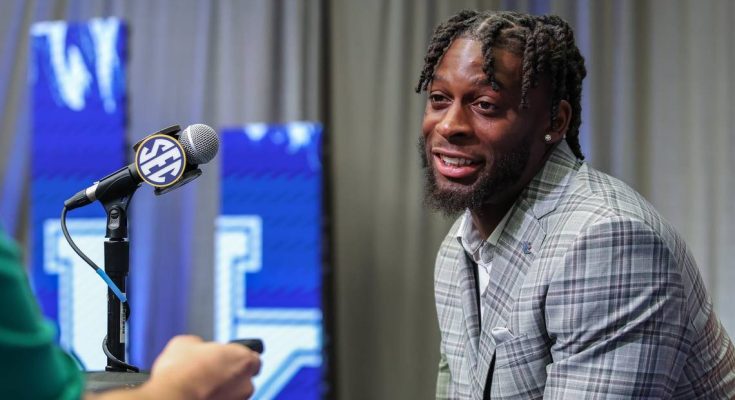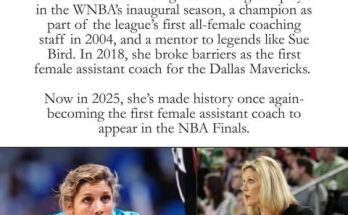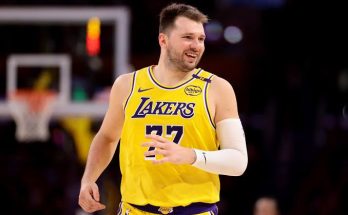Jordan Lovett has been one of the more promising talents in Kentucky’s secondary over the past few seasons, showcasing flashes of brilliance that gave fans plenty of reason to believe he could be a cornerstone of the Wildcats’ defense. But this offseason, his name was in headlines for reasons that extended far beyond football. In May, Lovett found himself in the national spotlight for an arrest that threatened to overshadow his athletic promise. Now, with preseason camp in full swing, the junior defensive back is owning up to his actions, expressing regret, and trying to shift the narrative back to where it started—on the football field.
The arrest occurred during what should have been a calm offseason. Lovett was charged with misdemeanor possession, a moment he now calls a “wrong decision at the wrong time.” Those seven words sum up the critical self-awareness he’s displayed since the incident became public. For a young man still navigating the early stages of adulthood, those words resonate with the experience of someone who understands the weight of choices and the scrutiny that comes with being a public figure, especially in the SEC.
Lovett didn’t duck questions when speaking with the media. Instead, he showed a maturity that goes beyond his years. “I knew I messed up,” he said. “It was one of those moments where you wish you could rewind time, but you can’t. So all you can do is learn from it and make sure it doesn’t happen again.” His message wasn’t scripted or overly rehearsed—it was raw and real, something his coaches, teammates, and even fans seemed to appreciate.
Head coach Mark Stoops has built a culture of accountability at Kentucky, one that doesn’t coddle players but also doesn’t discard them after a mistake. Stoops addressed Lovett’s situation earlier in the summer, noting that disciplinary action had been taken internally but emphasizing that the team wouldn’t abandon one of their own. “Jordan is a good kid,” Stoops said at the time. “He made a mistake, and he knows it. What matters now is what he does going forward. How he responds.”
And respond he has. Lovett returned to team activities with a renewed sense of urgency and focus. Teammates have noted that his work ethic seems elevated, that he’s been more vocal, and that he’s shown up earlier and stayed later at practice. Defensive backs coach Chris Collins said Lovett “owned up to what happened and made it clear he’s going to be better because of it. That’s all you can really ask for as a coach.”
It’s not unusual for young athletes to stumble, particularly when they’re adjusting to fame, expectations, and the pressures of being both a student and a high-level athlete. What separates the average from the exceptional isn’t whether they fall—it’s how they get back up. Lovett seems determined to let his actions over the coming months define his legacy, not one poor decision in the offseason.
Statistically speaking, Lovett has been a rising contributor. He appeared in all 13 games last season and started multiple contests, finishing with 62 total tackles, including two tackles for loss and one interception. He’s been reliable in coverage, physical in run support, and perhaps most importantly, he has the kind of football IQ that coaches covet. He was already expected to take a bigger role in the defense this year, but now, there’s added motivation—not just to help his team win, but to rebuild his reputation.
Lovett’s mistake could have lingered as a shadow, but his transparency has shifted the public conversation. Fans on social media have largely responded with support, emphasizing second chances and expressing hope that the incident was a mere blip on what could still be a stellar career. For a program like Kentucky, which prides itself on player development and character building, Lovett’s journey can serve as both a cautionary tale and a story of redemption.
There’s no denying that this incident was a test. But adversity often reveals character, and Lovett’s reaction has shown a level of growth that bodes well for both his future and the team’s culture. He’s chosen not to wallow or deflect. Instead, he’s focused on what he can control: preparation, leadership, and accountability.
This season will be critical for Kentucky’s defense. The Wildcats lost key veterans to graduation and the NFL Draft, meaning there’s an opening for players like Lovett to step into leadership roles. How he handles that opportunity will speak volumes. And based on his comments and conduct thus far, he’s treating that chance with the seriousness it deserves.
“I want to earn my teammates’ trust back, the coaches’ trust, and the fans’ trust,” Lovett said. “That’s something I take seriously. I know words only go so far. It’s about what I do every day from here on out.”
That kind of mindset is what every coach wants to hear, especially from someone expected to play a major role on the field. It shows that Lovett isn’t just trying to repair an image—he’s trying to improve as a person and a player. His willingness to face the situation head-on also sets an example for younger players who may face their own crossroads someday.
Off the field, Lovett has reportedly taken steps to reflect and realign. He’s talked about surrounding himself with better influences, focusing more on academics, and prioritizing structure in his daily life. These changes aren’t always visible in a box score, but they’re vital for long-term success. Players who learn from adversity often emerge more resilient, more focused, and more impactful.
It also speaks volumes that the Kentucky coaching staff has continued to place their trust in Lovett. They’ve sent a message that while consequences are necessary, so too is support. That balance is key in college athletics, where young men are learning life’s hardest lessons in real time and under the glare of public scrutiny.
In terms of football, Lovett’s potential remains sky-high. His blend of athleticism, instinct, and versatility makes him a valuable asset in Kentucky’s evolving defensive scheme. Whether he’s dropping into zone coverage or flying in on a blitz, Lovett has the tools to be a game-changer. With added motivation, he could very well have a breakout year.
He’ll have plenty of opportunities to prove himself when the season kicks off. The Wildcats face a tough SEC slate, and the margin for error will be razor thin. But if Lovett continues on his current path, he could become one of the anchors of the defense—a player known not for one mistake, but for how he responded to it.
In college football, storylines are often written in bold strokes. One moment can define a season or a player. But as Jordan Lovett is proving, those narratives can be rewritten with accountability, grit, and growth. His admission—”wrong decision at the wrong time”—isn’t an excuse. It’s a beginning.
And if he continues to work, lead, and evolve the way he has in the wake of his arrest, that beginning might very well lead to a remarkable ending. One not of disgrace, but of redemption. One built not on perfection, but on resilience. And in many ways, that’s the kind of legacy worth rooting for.



